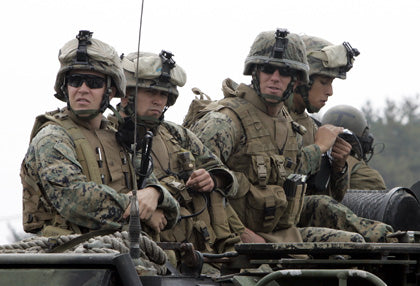 Words by Bridget Foster.
Words by Bridget Foster.
The Chairman of the Joint Chiefs of Staff, Army General Martin Dempsey, is reaching out to members of all the service branches for input on the proposed budget for 2015. Facing the return of sequestration in 2016, Dempsey and Defense Secretary Chuck Hagel proposed a budget that includes force reduction and restructure, as well as changes to pay, compensation and healthcare.

Photo courtesy of newstalkkgvo.com
The proposed cuts to troop size include shrinking the Army from 520,000 down to 440, 000 active duty soldiers, reducing the Army National Guard and Army Reserve by 5 percent, and dropping the Marine Corps from 190,000 to about 182,000. At the same time, the proposal calls for increasing special operations forces by about 4,000 personnel and adding 900 Marines to the security forces for US embassies. The budget also calls for retiring some weapons systems, such as the Air Force’s A-10 fleet and U-2 surveillance plane, as well as cancellation of the Army’s Ground Combat Vehicle program.
Stressing that no uniformed personnel will see a cut in pay, Hagel and Dempsey told reporters that the DoD could not sustain the current growth rate of compensation and pay; 50 percent of the defense budget is allocated to military and civilian compensation. Savings realized from adjustments to compensation and benefits would “ensure that service members are properly trained and equipped” the defense leaders added.
Addressing direct and indirect compensation, the budget proposal includes:
- A 1% pay raise for personnel
- Freezing the pay of general and flag officers
- Grandfathering any future changes to military retirement
- Slowing the growth of the basic housing allowance over five years without reducing the actual allowance
- Discontinuing the reimbursement for renters’ insurance
- Reducing the annual direct subsidy to commissaries by $1 billion over three years
- Simplifying and modernizing TRICARE (Admittedly, this one is not so bad)
The changes to the TRICARE health insurance plan are designed to make the program more efficient and encourage the use of military treatment facilities, preferred providers and generic prescriptions, according to Hagel. Recommendations were made to consolidate plans and make adjustments to copays and deductibles.

Retirees and some active duty family members would see an increase in their deductibles and copays; out-of-pocket expenses would rise from 8 percent to 11 percent. Retirees who choose TRICARE in addition to Medicare will also pay more to enroll in TRICARE. However, medically-retired members, their families and survivors of members who died on active duty would be exempt from paying the annual participation fees.
“What we are really trying to do here is find the right balance for our manpower costs in the context of the other things we’ve got to do,” Dempsey explained to reporters. “These changes have been examined and discussed over the past year at every level, to include the service chiefs and at monthly sessions,” he said.
“But we’re also going to want to hear from you,” Dempsey said. “As this budget is dropped next week on Capitol Hill…I encourage you to let us know what you think about the totality of the bill.”


Leave a comment
This site is protected by hCaptcha and the hCaptcha Privacy Policy and Terms of Service apply.